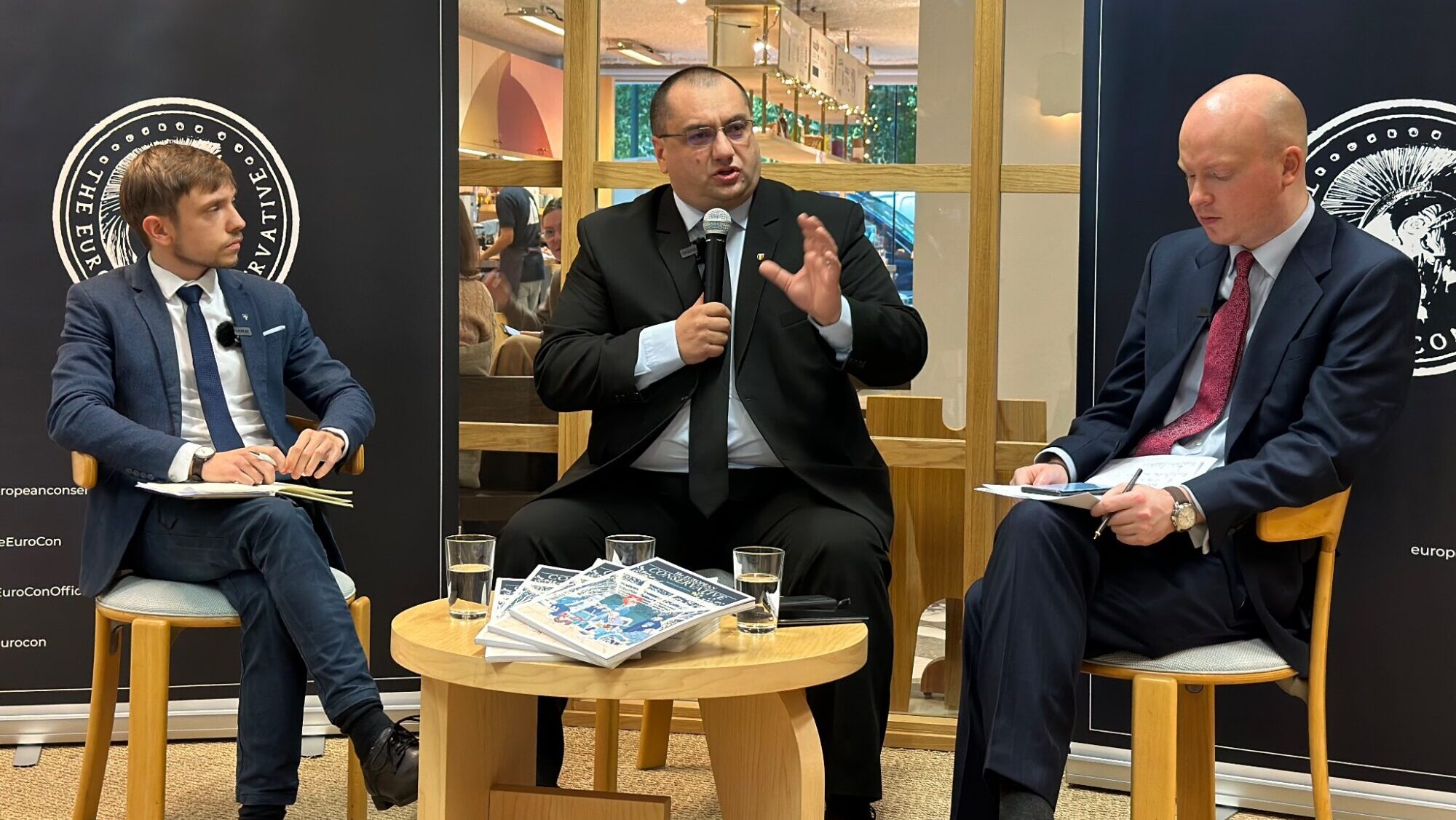
Left to right. Tamás Orbán, Cristian Terheș, and Ben Harris-Quinney
Photo: The European Conservative
Europeans have heard enough promises on the topic of migration. What they want—and what they need—is action.
At this week’s event on “The Broken Gate of Europe,” hosted by The European Conservative, Bow Group Chairman Ben Harris-Quinney hammered home that Britain’s Tory party has promised to bring immigration down—to the tens of thousands, no less—for well over a decade. Net migration last year stood at a record 606,000. The more significant gross figure was 1.2 million.
And while London and Brussels have loosened ties since Brexit, they continue to share an inability to grasp—or, perhaps, a lack of interest in grasping—this issue. And so despite commissioners pointing to the need for “better control of our external borders” following the horrific 2016 Brussels terror attack, few are likely to have really been shocked by the killing of two civilians in the very same city earlier this month by a terrorist who had slipped through the very same, still poorly controlled external borders. What’s more shocking, according to Romanian MEP Cristian Terheș, the event’s second panellist, is that just a couple of weeks after the innocent blood was shed, “nobody talks about it.”
This, Terheș added, is “the new Europe we … live in.” It is also the new Europe that current leaders are doing nothing to change.
Thank you for joining us today at our panel discussion on the implications of the crisis in #Lampedusa.
— The European Conservative (@EuroConOfficial) October 25, 2023
Special thanks to our speakers, @CristianTerhes, @B_HQ and @TamasOrbanEC.
Stay tuned for updates on our upcoming events, and we look forward to seeing you all again. pic.twitter.com/mfXcnnVMdp
After recently visiting Europe’s “broken gate” (Lampedusa, the southernmost island of Italy—closer to Tunisia than it is to Sicily) with Chris Tomlinson for The European Conservative, Tamás Orbán opened the discussion by suggesting that Brussels was recently forced to “wake up to the reality that it had ignored for more than a decade.” He said that the arrival this September of 7,000 migrants to the island of 6,000 in the space of just 48 hours made “irrefutable” the idea that Europe is at a“breaking point.”
Recognising that a breaking point has been reached and actually doing something about that fact are, however, very different things. Terheș noted:
Lampedusa proves we have a problem. Instead of approaching the problem of illegal migration systematically and pragmatically, the tendency at the EU level is to simply ignore it and hope it will go away by itself.
There are, he added, simple steps that could be adopted to properly address the growing crisis. Europe should build walls at land-based crossing hotspots and establish naval blockades at sea. Perhaps, Harris-Quinney added, it would be wise to pause immigration altogether for some years due to extreme numbers over the past decade. Both agreed that, when it comes to illegal immigration, it is most important to ensure hopeful arrivals know that if they arrive in Europe illegally, they will be sent back and never granted citizenship. And also that all decisions must be made offshore, as in Australia.
Terheș stressed that it is possible—vital, in fact—to be kind while also being firm; to ensure, for example, that there are proper routes for those who want to come in order to make a contribution. He said:
If you want to be charitable, I’m all for it … [but] we are also a society ruled by law [and that law is not being applied at our borders].”
The bigger problem, though, is moving beyond words and finally enacting change. Borders, according to Harris-Quinney, simply “cannot” be controlled while the liberal establishment is in charge. Brexit removed one layer of this in Britain, but the continued tardiness of the Conservative Party shows there is still a long way to go.
What about EU nations? The Bow Group chairman stressed that these are faced with a “stark choice: either [force the EU to] revert to a trading bloc or leave.” After all, “democracy and accountability” is the only way forward—especially given that the views of voters are starkly different from those of the ruling class.
This choice may be stark, but the result of doing nothing could be far worse. Harris-Quinney, in no uncertain terms, said:
We are living in the midst of collapse. Multiculturalism here is bottom-up apartheid; none of the cultures are dominant and none are part of the culture of the host nation.
Just as significant as Lampedusa are the pro-Palestinian protests across Europe. Even as a free speech absolutist, I believe you cannot have a society in which people are chanting “death to Israel.”
And while pushing these arguments may result in a fair amount of flack, it is worth always remembering that “those advocating for open borders” support a system that is resulting in a “war-scale” number of deaths because of boats sinking in the Mediterranean.
So after years of phoney talk on this ever-growing issue, it is no longer the time for “compromise,” Terheș concluded; the split here is not between the Right and the Left “but between right and wrong.”
There was, understandably, a fair amount of pessimism in the room about the chances of success in this regard—in fact, one audience member suggested that “pessimism may be too optimistic a word.” But Ben Harris-Quinney said that was no excuse for giving up; “you play to the whistle.”
